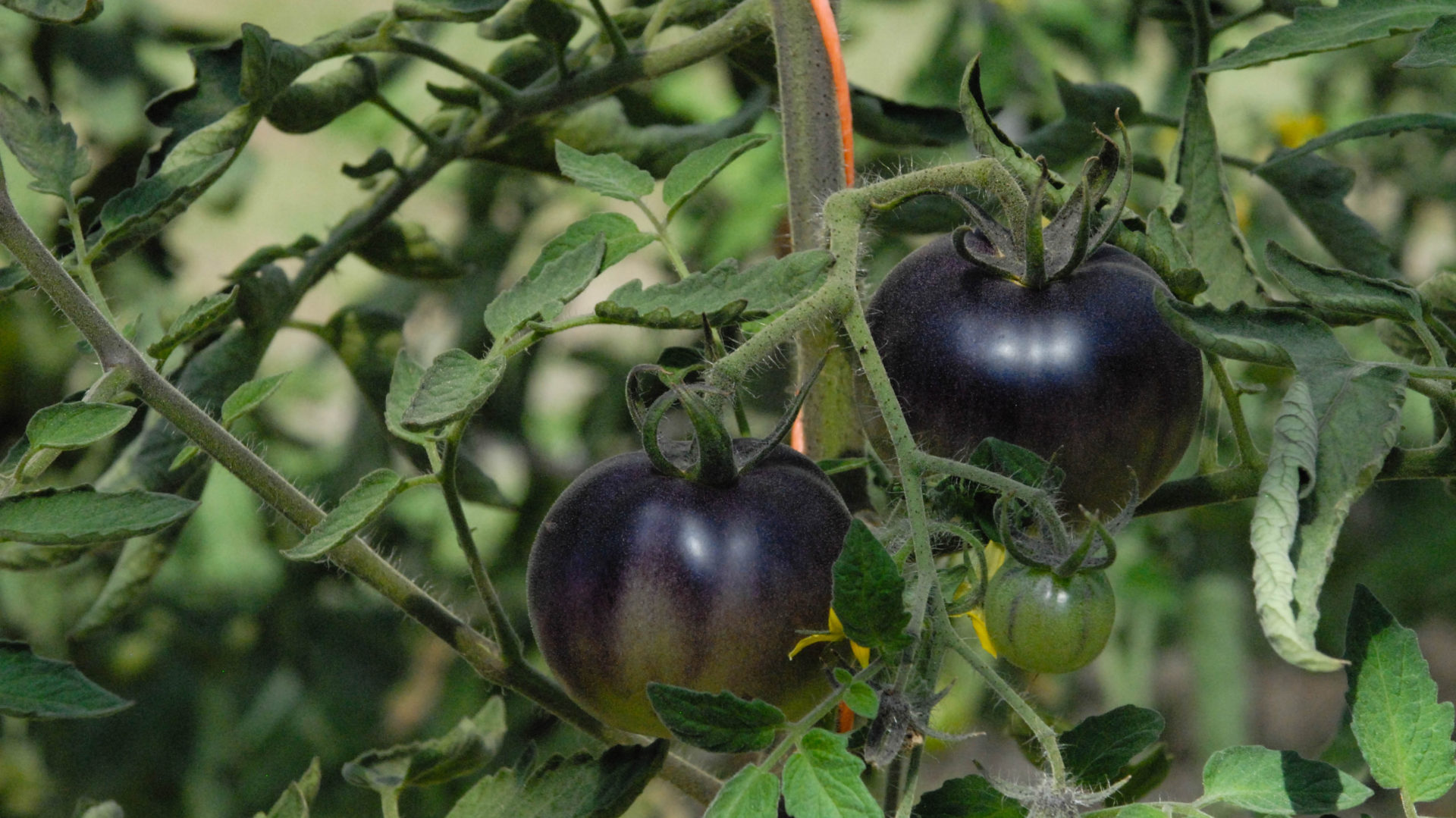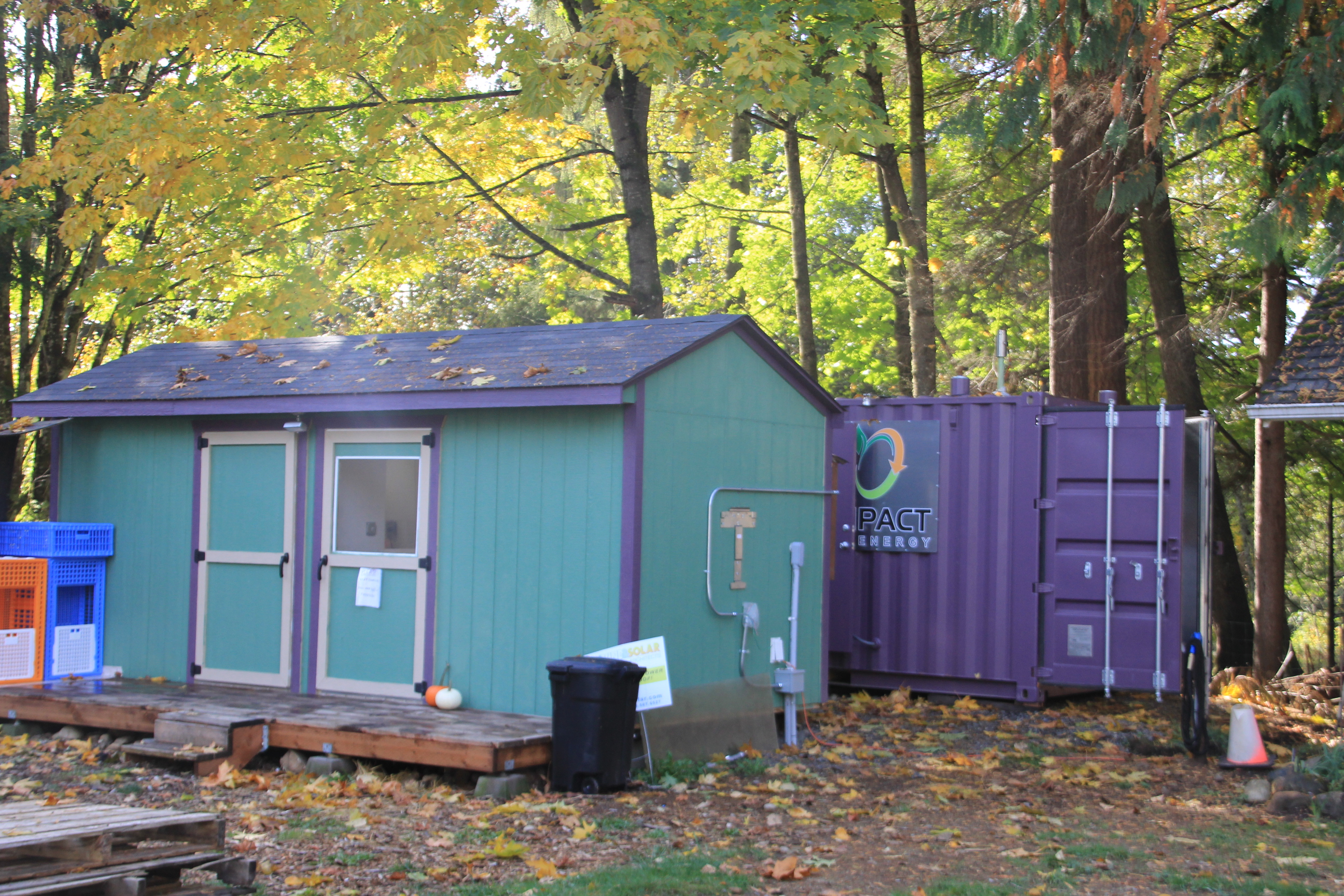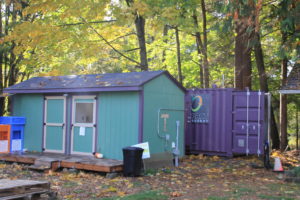
Tucked beneath a bigleaf maple tree on Laile Fletcher’s Crooked Shed Farm, a tidy, unassuming two-room building is big news for poultry farmers in the Snoqualmie Valley. This new facility, along with Laile’s recently-obtained WSDA Food Processor License and USDA Co-Pack Exemption, mean that farmers in the Sno Valley and surrounding areas now have a convenient and viable local option for processing their chickens, turkeys, ducks and rabbits for resale.
With the next-closest WSDA-Licensed processing facility more than a two-hour drive away, Laile Fletcher is stepping in to fill a crucial need for local farmers. In speaking with her about the new facility, one quickly gets the sense that this project was motivated not only for the benefit of her own farm, but even more so by the needs of the local farming community. “My goal was to support small farmers in the valley,” she notes, and “to provide a reliable, year-round service that folks can build or add on markets for the farms they have.”
Recalling how she embarked on this venture more than a year ago, Laile explained that when she decided to raise poultry to diversify her farm income beyond the fleece goats, Dexter cows, and Tamworth pigs she was already raising, she struggled to find someone to process her birds, so “I then decided that I would look into that, having helped other farms [with processing] and done some myself.”
After reviewing the Green Book (WSDA Handbook for Small and Direct Marketing Farms), visiting local markets, speaking with other farmers and “calling or emailing WSDA a ton of questions,” Laile decided to pursue the WSDA Food Processor License to process her own poultry. Additionally, the USDA Co-Pack Exemption allows her to process poultry and rabbits for other farmers, which can then be sold frozen, whole, or in cuts, at farmers markets, butcher shops, retail outlets, or to restaurants anywhere within Washington state.
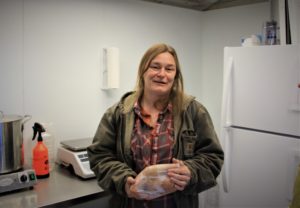
With this license, Laile can process up to 20,000 birds per year, and an unlimited number of rabbits. Unlike many processing facilities, Laile’s has no requirement for a minimum number of birds – a hurdle she faced when looking to process her own birds, and one she wanted to eliminate for other farmers. Being a one-woman show for now, Laile has the ability to process up to twenty-five birds per day, with farmers dropping birds off between 8:00-9:00 in the morning. She requests that birds be brought to the facility in boxes or crates, from which they can then be transferred to the holding crates tucked onto the front porch of her processing building.
Current pricing is as follows, and includes scald, pluck, gut, shrink wrap bags, label and waste disposal. Rabbits are skinned. Taxes extra.
| Chicken | $4.00 each |
| Duck | $12.00 each |
| Turkey (up to 20lbs) | $12.00 each |
| Turkey (21-25lbs) | $15.00 each |
| Rabbit | $6.00 each |
As can be expected with any venture of this scope involving licenses and permits, this project was not without its challenges. Laile comments that “As far as challenges, there has been a list and some we are still working on,” but one of the biggest challenges was simply getting in touch with the right people in various regulatory bodies as the project was getting underway. After being shuffled back and forth between different people at the county and state levels, she was eventually able to secure the required permits and move forward with constructing the facility and obtaining her license.
Another challenge was determining how to dispose of the remnants left over after the poultry has been processed. Where do those gizzards and buckets of greywater end up? The solution can be found by peeking behind the processing building, where a cheerful purple shipping container houses a fascinating bit of innovative technology: an anaerobic digester made by Impact Bioenergy. The leftovers from poultry processing are added to the digester’s “stomach,” where they are broken down by bacteria and give off waste products that are put right back to work: waste heat is used to warm the circulating water that keeps the digester at an optimal 100 degrees; methane gas is collected in a large bladder and is used to produce electricity that will be fed back into the power grid; and once fully digested, the liquid digestate can be used as a soil amendment – an offering that Laile hopes to have available to local farmers.
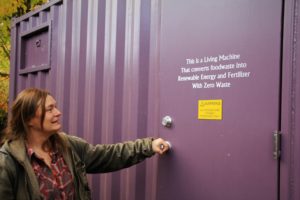
The digester is yet another example of a common theme at Crooked Shed Farm, where a problem isn’t merely solved, but is leveraged to create greater benefits. The digester solves the issue of waste disposal, but also creates electricity and material for soil amendments. The new poultry processing facility solves Laile’s problem of finding someone to process her birds, but also creates potential new opportunities for other local farmers who’ve considered adding chickens or turkeys to their farms, but have hesitated due to lack of local processing options.
What’s next? Laile is looking into obtaining organic certification for the poultry processing facility, so that she can process organic birds as well.
“We’re trying to make it work,” Laile says, “and we’re trying to show others that it can work.”
—
For more information on poultry processing at Crooked Shed Farm, contact Laile Fletcher at farmer@crookedshedfarm.com or (425) 328-6650.
Need a copy of the Green Book for your own reference? Stop by and see us at the SnoValley Tilth Office (above Carnation City Hall) to pick one up! You can also find it online here.
Photos by Melissa Borsting.

